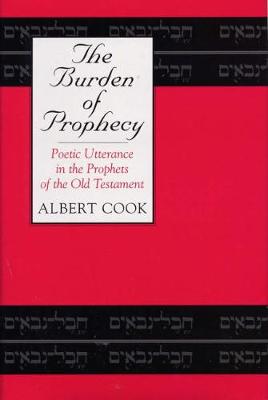Albert Cook examines the poetic and scriptural thinking of the Hebrew prophets and wisdom writers, focusing on the details of their thematic concentrations and on the posture they assume to orient themselves in their utterances.
Homer, Confucius, the poets ofthe Confuciananthology, and the authors of the Zend Avesta and the Rig Veda are variously endowed with an authority empowered by the instituted religious thought of their times. Each writer, Cook contends, rests firmlyin the reassurances provided bythe particular context.
Cook argues, however, that the Hebrew prophet comes forward and presents himself as open to themomentary utterances of God. This Godis not primarily an imageor a symbol; the Hebrew Yahweh is a force thatmanifests Himself in developing history. In that dangerous situation, theprophet remains open directly to Godand gets a continually renewed verbal authority and power from that flow.
Since, as Cook demonstrates, the prophet is commenting on the constantly changing flow between God and people, every utterance is essentially a progress report rather than a finally poised formulation, even though the utterance is formulated in reference to the basic valuesof righteousness and the law and in measured analogy to such defining tribal experiences as theExodus. Radically distinct from other religiouspoetry, therefore, Hebrew prophecy rises fromand refers to a complex and specific occasion.
Most poetry looks toward the past. Keats, LiPo, and Pindar, for example, all offer the profundity of a stocktaking. Thepoetry of the Hebrewprophet, however, is oriented toward the future.At worst, the prophet s perception and goal canlead to an informed readiness for the future; at best, they can lead to a restoration of the people's covenant with God. In any case, they will lead to a future whose features are compassed in the articulated vision.
In The Burden of Prophecy, Cook explores the implications of these conditions as he examines the Old Testament books of the prophets and their successors: Amos, Isaiah, Jeremiah, Ezekiel, Psalms, Ecclesiastes, Zechariah, and Daniel.
"
- ISBN10 0809320835
- ISBN13 9780809320837
- Publish Date 19 February 1997
- Publish Status Out of Print
- Out of Print 24 April 2021
- Publish Country US
- Imprint Southern Illinois University Press
- Format Hardcover
- Pages 192
- Language English
